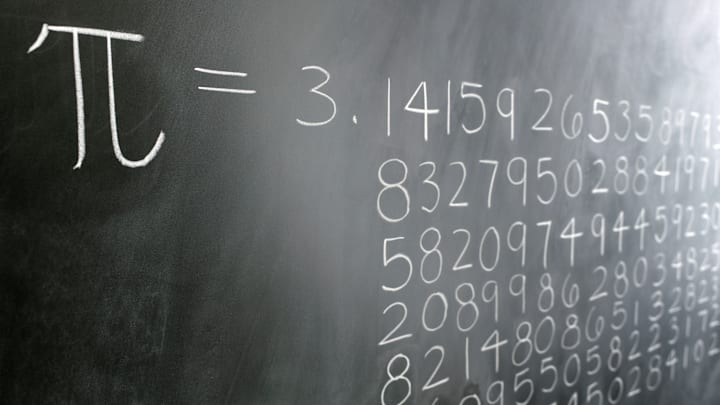Pi Day (March 14, or 3/14) offers something for the math-lover, of course, but also for the baked-goods lover (Bake a pi pie!), the music lover (Sing some Pi Day carols!), and the parade lover (March in a pi-rade!) But what about the word lover?
- How Many Digits Are in Pi?
- Pi Record Holders
- How to Memorize Pi with Words
- How Haraguchi Memorized 100,000 Digits of Pi
How Many Digits Are in Pi?
Most of us probably only know the first three numbers in pi—3.14—but the number is getting bigger all the time. In 2021, Thomas Keller and a team at University of Applied Science of the Grisnos in Switzerland used what Guinness World Records called a “high-performance computer” to add 12.8 billion new digits to pi, putting the official number at 62,831,853,071,796 digits. “By my estimate, if these digits were printed out they would fill every book in the British Library ten times over,” math lecturer Julia Collins wrote for The Conversation. Finishing the computation took a staggering 180 days and nine hours.

As for why we need to know all of those digits of pi, Collins gives two reasons: Trying to find more digits in pi aids in “the development and testing of supercomputers and new high-precision multiplication algorithms,” which “leads to computer hardware and software that benefit many other areas of our lives.” But it also helps us understand pi itself; as Collins notes, “Despite centuries of research, there are still fundamental unanswered questions about the way its digits behave.”
Pi Record Holders
Pi enthusiasts have performed amazing feats of memorization, reciting the number to thousands of digits. In 2005, Chao Lu recited it to 67,890 digits without an error, garnering a Guinness World Record; in 2015, Rajveer Meena surpassed Lu’s record by reciting 70,000 digits while wearing a blindfold. But even though he doesn’t have a Guinness World Record, Akira Haraguchi might be the pi champion: He recited 100,000 digits in Tokyo in 2006, a feat that took 16.5 hours.
How to Memorize Pi with Words
Memorizing pi doesn’t have to be done through numbers—it can also be done through words. This sentence how I wish I could calculate pi gives you pi to seven places. Just count the number of letters in each word, and you get 3.141592.
Here are some other pi sentences from the Pi Wordplay page at Wolfram Mathworld.
- “May I have a large container of coffee?” gives you 3.1415926.
- “How I want a drink, alcoholic of course, after the heavy lectures involving quantum mechanics” gives you 3.14159265358979.
You can take that one a step further:
- “How I want a drink, alcoholic of course, after the heavy lectures involving quantum mechanics, and if the lectures were boring or tiring, then any odd thinking was on quartic equations again” gives you 3.1415926535897932384626433832795.
But why stop there? Sasha Volokh of the Volokh Conspiracy composed a passage that takes pi out to 167 digits. Mike Keith’s “Cadaeic Cadenza” takes it out to nearly 4000 digits (the last line is “I end, whispering ad infinitums").
The technique can work in other languages too. If you prefer French, there’s this:
- “Moi, j’aime a faire connaitre un nombre utile aux sages” (which translates to “Me, I like to teach a number useful to wise ones”) gives you 3.1415926535.
How Haraguchi Memorized 100,000 Digits of Pi
Pi writing, also known as Pilish, is a neat trick, but it can be hard to come up with seven, eight, and nine letter words that fit just right into a valid sentence. There are other techniques that allow more freedom of expression on the language side. Haraguchi, who recited pi to 100,000 digits, he did it by taking advantage of the structure of Japanese words, which can be broken down into strings of a limited set of syllables. The first 15 digits of pi can be captured in a four-word, fifteen-syllable sentence:
- Saishi ikokuni mukosan kowakunaku, meaning “The wife and children have gone abroad; the husband is not scared.”
Haraguchi’s system is particularly useful and flexible because he doesn’t assign a single syllable to each numeral. Japanese has a limited but large set of syllables, about 100. He takes advantage of all of them by assigning each of the numerals 0–9 to a whole group of syllables. For example, 1 can be a, i, u, e, hi, bi, pi, an, ah, hy, hyan, bya, or byan. This way, a far larger number of words can be converted into strings of numerals.
According to a 2006 article about him in The Japan Times, Haraguchi was able to memorize so much by creating “a myriad of stories and poems, including a story about the legendary 12th-century hero Minamoto no Yoshitsune and his sidekick Benkei, who was a Buddhist monk.” Not that that makes it easy. He still had to internalize his system through years of practice, and he had to remember the stories. Still, it shows there are all kinds of ways to explore the infinite mysteries of pi, and that word lovers need not be left out of the fun.
If you find it easier to memorize through music than the written word, AsapSCIENCE has you covered with this catchy tune, which will help you memorize the first 200 digits of pi through song:
Read More Articles About Numbers and Math:
A version of this story ran in 2015; it has been updated for 2024.
